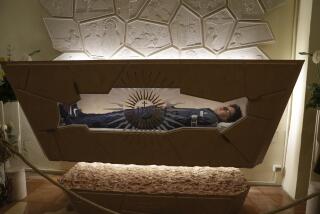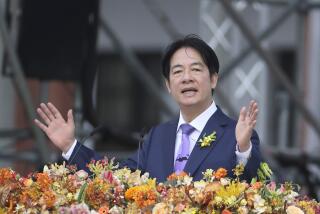Breakup of Palace Guard Helps to Demilitarize Haiti
For more than 60 years, Haiti’s gleaming white concrete Presidential Palace, with its massive, bomb shelter-like central dome, has looked less like a seat of government than a huge military bunker ringed by armed soldiers and heavy weapons.
Tyrants ruled and occasionally cowered there, protected by a Presidential Guard battalion that became such a rogue force that it actually lorded it over the army high command and put the country’s last two military presidents in power.
The guards safeguarded the hated Francois (Papa Doc) Duvalier and his son and successor, Jean-Claude (Baby Doc), through their 29-year reign of terror. The most successful of its officers, Prosper Avril, is widely thought to have acted as the tyrants’ bag-man in spiriting hundreds of millions of dollars in public money to secret bank accounts abroad.
The guard rescued the Duvaliers’ bumbling U.S.-backed successor, Gen. Henri Namphy, then later deposed him to name the smooth-talking Avril to power.
Under Avril’s tutelage last April, the Presidential Guard demolished the only other tactical units in the Haitian armed forces, the Dessalines and Leopard Battalions, which had mutinied against it and Avril.
After that, the guard reigned supreme, with its corporals and sergeants telling generals what to do. Until Avril was deposed by pro-democracy civilians last weekend, the fortress-like Presidential Palace had become, in effect, army headquarters.
Today, for the first time since it was built in 1922, the palace is demilitarized. The anti-aircraft guns that sat on its broad front lawn have been removed, as have the armored cars and machine-gun emplacements that squatted menacingly behind the foliage. Instead of the slouching, undisciplined guardsmen lounging around the palace, the only troops in sight now are a half-dozen uniformed gate-keepers.
A newly installed provisional civilian government, led by a scholarly woman Supreme Court justice, Ertha Pascal Truillot, has taken its first tentative steps to turn the palace into the real “White House” of a fledgling democracy.
The dreaded Presidential Guard is no more. The long-feared army is said to have undergone an overnight transformation into the pussycat of the Caribbean. The rag-tag force of 8,300 men--whose ranks have included terrorists, drug dealers, common criminals and military dictators--is out of politics and is being restructured as a national police force, according to the optimistic accounts of diplomats, Haitian political leaders and foreign military specialists.
But many Haitians and foreigners here remain deeply skeptical of such a dramatic turnaround in an armed force that has for almost two centuries ruthlessly overrun all attempts to democratize the Western Hemisphere’s hungriest, poorest, most disease-ridden country.
“This is not a real army,” said a diplomat from a Commonwealth country. “It’s a bunch of undisciplined and corrupted men who have gotten rid of other governments in the past. There’s nothing to stop them from getting rid of this one, too.”
But Haitian political leaders and foreign diplomats who helped to guide the massive public protests that ejected Avril and the guard from the palace insist that Haiti at last is truly free of its oppressive military.
“They’ve crossed a Rubicon,” said one military specialist.
Explaining the reasons for the army leaders’ unexpected willingness to bow to civilian rule, two of the military experts, along with several Western diplomats and Haitian politicians, sketched the picture of an army in turmoil during Avril’s last days.
The army that once was united under the command of Gen. Namphy and his predecessors began disintegrating when Avril took power in September, 1988, one of the experts said. Many officers and troops in the provinces and in the Dessalines and Leopards Battalions envied the guard’s perquisites, which included the profits of widespread bribery and corruption, he said. Avril had bought the guards’ loyalty by granting lucrative criminal concessions and other opportunities for corruption to a core group of 50 to 60, most of them from the units’ dominant 48th Company, whose officers bullied or bribed the rest of the guards into going along.
The rest of the army, meanwhile, was quietly reorganized by its acting commander in chief, Maj. Gen. Herard Abraham, after the dissolution of the Dessalines and Leopards Battalions last April. By November, Avril realized that he had created a monster and was in effect a prisoner of his own palace guard, one of the experts said. He turned to Abraham for assurance that the rest of the army would stand fast as he attempted to bring the guard under control.
“There were two armies out there, not even talking to each other,” said one expert. Beginning in December, he said, Avril began transferring about 40 officers and men a month out of the 1,300-man guard, moving cautiously so as not to provoke a mutiny. By early March, he had gotten rid of all but a handful of the tough core group in the 48th Company, leaving a reasonably disciplined force of about 900 men in the palace.
Thus, Avril defanged the guard but engineered the situation that allowed civilian politicians to force him out of power, said an expert. When it became obvious that he had completely lost control over the rest of the army and could no longer govern, the guardsmen meekly submitted to orders to move out of the palace and put themselves under Abraham’s discipline.
Abraham and fellow officers in the general command, meanwhile, had persuaded skeptical pro-democracy leaders that they were fed up with both the criminal and political corruption and had only one goal: to reform the army and defend the constitution under democratic civilian rule, according to the military experts, the diplomats and the politicians.
Despite its reputation, the army still has many honest officers and men, said a former government official now working with the pro-democracy forces.
“I knew Abraham was an honest man when I learned that he owns only one modest house. The corrupt officers have three or four mansions,” he said.
The experts say the last dozen or so troublemakers from the guard have been cashiered and that some eventually will be tried for criminal offenses.
“No one calls it the guard any more--it is already being disbanded,” said one.
Still, the army remains an armed force. And there remains a substantial security threat from other armed men in Haiti, gunmen left over from the Duvalier dynasty and a national network of civilian strong-arm men called attaches that were organized by Avril.
The real test now, according to Louis Roy, father of Haiti’s constitution and a member of the provisional government, will be how Abraham’s new-image army faces up to the security threat from the civilian thugs who are still at large. “If they don’t do that, it will be a national disaster,” said Roy. But he added, “I’m ready to give them the benefit of the doubt.”
More to Read
Start your day right
Sign up for Essential California for news, features and recommendations from the L.A. Times and beyond in your inbox six days a week.
You may occasionally receive promotional content from the Los Angeles Times.






